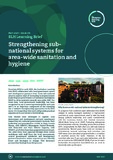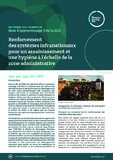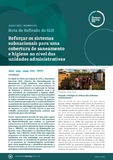Strengthening Sub-national Systems for Area-wide Sanitation and Hygiene
Renforcement des systèmes infranationaux pour un assainissement et une hygiène à l’échelle de la zone administrative;
Reforçar os sistemas subnacionais para uma cobertura de saneamento e higiene ao nível das unidades administrativas
| dc.contributor.author | Coultas, Mimi | |
| dc.coverage.spatial | Uganda | en |
| dc.coverage.spatial | Rwanda | en |
| dc.coverage.spatial | Kenya | en |
| dc.date.accessioned | 2021-05-21T15:31:23Z | |
| dc.date.available | 2021-05-21T15:31:23Z | |
| dc.date.issued | 2021-05-20 | |
| dc.identifier.citation | Coultas. M. (2021). ‘Strengthening Sub-national Systems for Area-wide Sanitation and Hygiene’ Sanitation Learning Hub Learning Brief 9, Brighton: Institute of Development Studies, DOI: https://doi.org/10.19088/SLH.2021.007 | en |
| dc.identifier.citation | Coultas. M. (2021). « Renforcement des systèmes infranationaux pour un assainissement et une hygiène à l’échelle de la zone administrative » , Note d’apprentissage 9 de la SLH, Sanitation Learning Hub, Brighton : IDS. DOI: 10.19088/SLH.2021.013 | fr |
| dc.identifier.citation | Coultas. M. (2021). ‘Reforçar os sistemas subnacionais para uma cobertura de saneamento e higiene ao nível das unidades administrativas’ Nota de Reflexão 9 do SLH, Sanitation Learning Hub Learning Brief 9, Brighton: Institute of Development Studies, DOI: 10.19088/SLH.2022.012 | pt |
| dc.identifier.isbn | 978-1-78118-481-3 | |
| dc.identifier.isbn | 978-1-80470-015-0 | |
| dc.identifier.uri | https://opendocs.ids.ac.uk/opendocs/handle/20.500.12413/16614 | |
| dc.description.abstract | From late 2020 to early 2021, the Sanitation Learning Hub (SLH) collaborated with local government actors and development partners from three sub-national areas to explore ways of increasing local government leadership and prioritisation of sanitation and hygiene (S&H) to drive progress towards area-wide S&H. For some time, local government leadership has been recognised as key to ensuring sustainability and scale and it is an important component of the emerging use of systems strengthening approaches in the S&H sector. It is hoped that this work will provide practical experiences to contribute to this thinking. Case studies were developed to capture local government and development partners’ experiences supporting sub-national governments increase their leadership and prioritisation of S&H in Siaya County (Kenya, with UNICEF), Nyamagabe District (Rwanda, with WaterAid) and Moyo District (Uganda, with WSSCC), all of which have seen progress in recent years. The cases were then explored through three online workshops with staff from the local governments, central government ministries and development partners involved to review experiences and identify levers and blockages to change. This document presents key findings from this process. | en |
| dc.description.abstract | Entre la fin de 2020 et le début de 2021, la Sanitation Learning Hub (SLH) a collaboré avec des acteurs des autorités locales et les partenaires de développement de trois zones infranationales afin d’explorer des moyens d’accroître le leadership des collectivités locales et donner la priorité à l’assainissement et l’hygiène (A&H) pour faire progresser l’A&H à travers toute la zone. Depuis quelque temps, le leadership des autorités locales est reconnu comme essentiel pour garantir la durabilité et l’envergure des initiatives et c’est un élément important de l’utilisation émergente des approches visant à renforcer les systèmes dans le secteur de l’A&H. Il est espéré que ces travaux fourniront des expériences pratiques pour contribuer à ce raisonnement. Des études de cas ont été élaborées pour capturer les expériences des collectivités locales et des partenaires de développement afin d’aider les autorités infranationales à accroître leur leadership et donner la priorité à l’A&H dans le comté de Siaya (Kenya, avec l’UNICEF), le district de Nyamagabe (Rwanda, avec WaterAid) et le district de Moyo (Ouganda, avec le WSSCC), qui ont tous enregistré des progrès ces dernières années. Les cas ont ensuite été analysés à travers trois ateliers en ligne avec du personnel des pouvoirs publics, des ministères des autorités centrales et des partenaires de développement concernés pour passer en revue les expériences et identifier des leviers et des obstacles possibles au changement. Ce document présente les principales conclusions de ce processus. | fr |
| dc.description.abstract | De finais de 2020 a princípios de 2021, o Sanitation Learning Hub, (Centro de Aprendizagem de Saneamento [SLH]) colaborou com actores do governo local e parceiros de desenvolvimento de três zonas subnacionais na exploração de formas de fomentar a liderança do governo local e de dar prioridade ao saneamento e higiene (S&H), promovendo o progresso rumo a serviços alargados de S&H à totalidade dessas zonas. Já há algum tempo se tinha reconhecido que a liderança do governo local é essencial para garantir a sustentabilidade e a ampliação da escala e constitui uma componente importante das abordagens emergentes de reforço de sistemas no sector do S&H. Espera-se que este trabalho proporcione experiências práticas que contribuam para esta reflexão. Foram desenvolvidos estudos de caso para captar as experiências do governo local e dos parceiros de desenvolvimento que apoiam os governos subnacionais no fortalecimento da sua liderança e priorização de S&H no distrito de Siaya (no Quénia, com o UNICEF), no distrito de Nyamagabe (no Ruanda, com a WaterAid) e no distrito de Moyo (no Uganda, com a WSSCC), tendo todos eles registado progressos nos últimos anos. Os casos foram então analisados em três workshops com pessoal dos governos locais, os ministérios do governo central e os parceiros de desenvolvimento envolvidos, para rever experiências e identificar alavancas e bloqueios à mudança. Este documento apresenta as principais conclusões deste processo. | pt |
| dc.description.sponsorship | Sida | en |
| dc.language.iso | en | en |
| dc.publisher | The Sanitation Learning Hub, Institute of Development Studies | en |
| dc.relation.ispartofseries | SLH Learning Brief;9 | |
| dc.rights | You may not use this work for commercial purposes No Derivative Works: You may not alter, transfer, or build on this work. Users are welcome to copy, distribute, display, translate or perform this work without written permission. For any reuse or distribution, you must make clear to others the licence terms of this work. If you use the work, we ask that you reference the SLH website and send a copy of the work or a link to its use online to the following address: Sanitation Learning Hub, Institute of Development Studies, University of Sussex, Brighton, BN1 9RE, UK (SLH@ids.ac.uk). | en |
| dc.rights.uri | http://creativecommons.org/licenses/by-nc-nd/3.0/ | en |
| dc.subject | Participation | en |
| dc.subject | Rural Development | en |
| dc.subject | Water | en |
| dc.title | Strengthening Sub-national Systems for Area-wide Sanitation and Hygiene | en |
| dc.title | Renforcement des systèmes infranationaux pour un assainissement et une hygiène à l’échelle de la zone administrative | fr |
| dc.title | Reforçar os sistemas subnacionais para uma cobertura de saneamento e higiene ao nível das unidades administrativas | pt |
| dc.type | Other | en |
| dc.rights.holder | Institute of Development Studies | en |
| dc.identifier.team | Participation | en |
| dc.identifier.doi | 10.19088/SLH.2021.007 | |
| dc.identifier.doi | 10.19088/SLH.2021.013 | |
| dc.identifier.doi | 10.19088/SLH.2022.012 | |
| dcterms.dateAccepted | 2021-05-09 | |
| rioxxterms.funder | Default funder | en |
| rioxxterms.identifier.project | The Sanitation Learning Hub | en |
| rioxxterms.version | VoR | en |
| rioxxterms.versionofrecord | 10.19088/SLH.2021.007 | en |
| rioxxterms.funder.project | 5e50f69d-6102-4a66-b12d-49ceb02612b0 | en |
Files in this item
This item appears in the following Collection(s)
Except where otherwise noted, this item's license is described as You may not use this work for commercial purposes No Derivative Works: You may not alter, transfer, or build on this work.
Users are welcome to copy, distribute, display, translate or perform this work without written permission. For any reuse or distribution, you must make clear to others the licence terms of this work. If you use the work, we ask that you reference the SLH website and send a copy of the work or a link to its use online to the following address:
Sanitation Learning Hub, Institute of Development Studies,
University of Sussex, Brighton, BN1 9RE, UK (SLH@ids.ac.uk).




